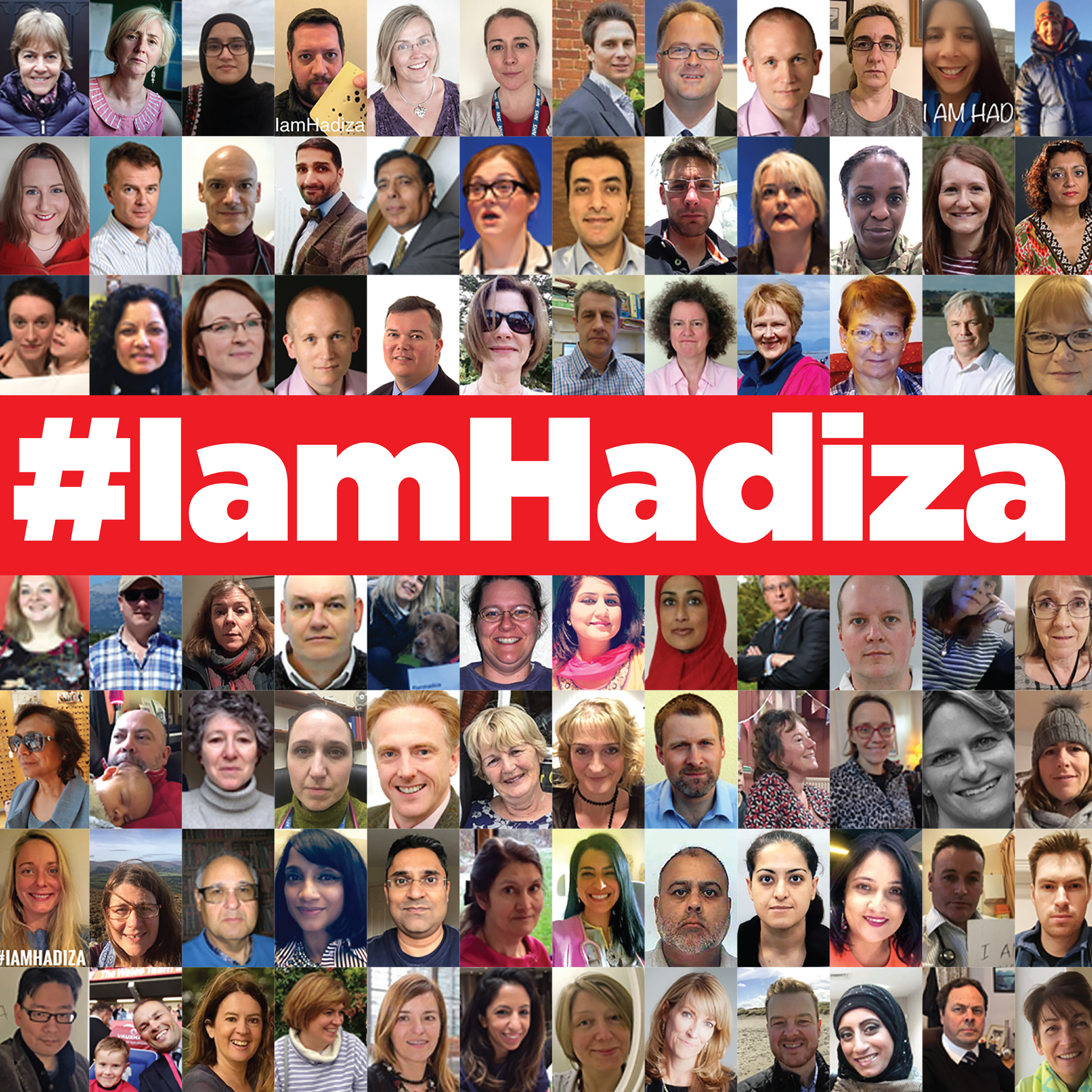Dr Hadiza Bawa-Garba was a model junior doctor with an unblemished record.1
She was in the top third of paediatrics trainees, according to the head of the University of Warwick-Leicester Medical School. Despite all that has subsequently happened, her supervisor tells Pulse: ‘I’d be happy for her to care for my own children.’
Her life was turned upside down after the events of 18 February 2011 at Leicester Royal Infirmary (LRI).
That was the day she worked her first acute shift following an 11-month period of maternity leave and she was straight back in at the deep end. Due to staff shortages, Dr Bawa-Garba was the most senior doctor covering the clinical assessment unit, the emergency department and the ward that day.1
An IT problem meant test results were not getting through and her senior house officer was unavailable, tied up chasing lab test results on the phone. There was an ongoing shortage of nurses so LRI was relying on agency staff. And to cap it all, there was no dedicated consultant in the CAU as the on-duty doctor Dr Stephen O’Riordan had not realised that he was meant to be on call and did not arrive until late in the afternoon.3
For any junior doctor, this would be a challenging situation to say the least. But as Dr Bawa Garba later admitted, she had become ‘deskilled’ after maternity leave so it was even more demanding.4
#IamHadiza: Pulse front cover shows GP solidarity with Dr Bawa-Garba

dr hadzia bawa garba mosaic 3×2
At 10:30am, Dr Bawa-Garba first saw Jack Adcock, a six-year-old boy with Down’s syndrome and a known heart condition, who had been suffering from diarrhoea, vomiting and breathing difficulties. Dr Bawa-Garba tried to stabilise him, based on a working diagnosis of gastroenteritis, but she also ordered tests to determine whether there was something more serious going on, and then turned her attention to other acutely ill children.
But Jack did have something more serious: sepsis. And it was the delay in her reviewing his X-rays and blood results that were her undoing. She prescribed antibiotics at 3pm, but Jack died later that day with Dr Bawa-Garba at his bedside attempting CPR.
I’d be happy for her to care for my own children
Dr Jonathan Cusack
Over the next few months, the death was treated as the type of tragic case that can sadly occur. The hospital carried out its own ‘significant untoward incident’, investigation, which found multiple errors across the system.1 A police investigation was dropped in 2012 after the Crown Prosecution Service concluded the evidential test for prosecution of anyone involved had not been met.
But that was not the end of the story. At the coroner’s hearing in July 2013, Dr Bawa-Garba acknowledged she had failed to recognise Jack’s ‘grossly abnormal’ blood results and that she was ‘not on top of things’ after her long shift. Then intensive care consultant at Birmingham Children’s Hospital Dr Gale Pearson told the coroner he was ‘sure beyond reasonable doubt’ that Jack would not have had died if he had been treated properly while in hospital.5
Pulse has learned that it was this evidence that reversed the CPS decision not to prosecute, and precipitated a five-year court ordeal that resulted in Dr Bawa-Garba being successfully prosecuted for gross negligence manslaughter alongside nurse Isabel Amaro in December 2015.
At the trial, the judge asked the jury to determine whether Dr Bawa-Garba’s failures over the death of Jack Adcock were not simply honest errors, but ‘truly exceptionally bad’. While Mr Justice Nicol said the jury had to take into account all the ‘surrounding circumstances, including what other people were or were not doing’, he also implored the jury to judge ‘each defendant… for her owns acts and omissions’.3 The jury determined that Dr Bawa-Garba was guilty and she was given a two-year suspended sentence.
The newspapers at the time focused on the outrage at Dr Bawa-Garba ‘going free after pleading she has to care for her disabled child’ and the anger of Jack Adcock’s mother at the trial.
Dr Bawa-Garba sought leave to appeal this conviction, but this was denied in December 2016. The one chink of light for her was that the Medical Practitioners Tribunal Service dismissed an appeal from the GMC to have her struck off, saying there was a lack of evidence to suggest her actions on the day Jack died were ‘deliberate or reckless’ and she did ‘not present a continuing risk to patients’.1
#IamHadiza: GPs share stories of when it could have been them

bawa garba iam hadiza contact sheet square
But the GMC decided to take the MPTS to the High Court in an astonishing act of defiance against its own tribunal service.
Despite the fact that the experts on the MPTS panel had scrutinised all the evidence, including the hospital’s original significant event report, the GMC argued its verdict was ‘simply wrong’. Chief executive Charlie Massey insisted the regulator could not ‘allow tribunals to unpick the findings and outcomes of the criminal court process’.
It was a decision that rocked medicine. A petition was started against the GMC’s action, garnering 11,000 signatures, and articles in support of Dr Bawa-Garba began to appear. Broadcaster Nick Ross, an honorary fellow of the Royal College of Physicians and life fellow of the Royal Society of Medicine, accused the GMC of acting like a ‘kangaroo court’.6
Despite this, the High Court agreed with the GMC in January of this year, that Dr Bawa-Garba should be struck off and prevented from ever practising medicine in the UK again. The judge held that the MPTS was ‘wrong to conclude… public confidence in the profession and its professional standards could be maintained by any sanction short of erasure’.1
But the backlash against the decision was instant. A drive to raise funds for an appeal has raised more than £350,000, with donations from almost 11,000 people. A letter that said holding doctors culpable for systemic problems ‘can only lessen our chances of preventing a similar problem in future’ has attracted more than 8,000 signatures, and a march to the GMC headquarters is taking place this month to protest against Dr Bawa-Garba’s criminal conviction and erasure.
BMA chair Dr Chaand Nagpaul said ‘many doctors now feel that there is a culture of fear, blame and defensiveness in the NHS’ following the ruling. The British Association of Physicians of Indian Origin went further, saying ‘inherent bias’ against black and minority ethnic doctors lay behind the GMC’s decision to go to the High Court. This was strongly rejected by Mr Massey as ‘troubling and without merit’.7
The Academy of Medical Royal Colleges expressed concern over the possible use of Dr Bawa-Garba’s own reflections in the case, and House of Commons Health Committee chair Dr Sarah Wollaston said: ‘There will need to be a review… to make sure clinicians can learn from errors rather than be fearful of discussing them.’ Even health secretary Jeremy Hunt said he was ‘perplexed’ by the GMC’s actions.
1990s: Bristol heart scandal; 2000s: Mid Staffs hospital; 2018: Hadiza Bawa-Garba. Events that changed the practice of medicine. Utterly
Professor Martin Marshall
Whether and how the reflections were used the case is still a matter of debate, but the reaction from grassroots GPs has been more visceral. They recognise the parallels with doctors across the whole of the health service, working under unprecedented strain and trying to do their best, but now under the threat of a manslaughter conviction and an automatic end to their career for one slip-up.
This case may mark the final withdrawal of the medical profession’s goodwill towards the NHS – an indispensible resource in these straitened times for the health service. As a letter from the GP Survival pressure group puts it, the GMC’s ‘unnecessary and vindictive pursuit of Dr Bawa-Garba… have damaged the confidence and morale of the entire medical profession’.8
UK GPs know only too well the dangers of an overwhelming workload; they have an average of 41.5 daily patient contacts – 60% more than is considered safe by European GPs, according to estimates by Pulse9. This leaves many feeling at a risk of mistakes and causing potential harm. Efforts by the BMA to cap GP workload have yet to bear fruit and Pulse has been inundated since the court case with GPs wanting to speak out about their own ‘I am Hadiza’ moments.
For some, the episode throws the credibility of the GMC into doubt. Even the regulator of regulators – the Professional Standards Authority – said the grounds for its decision to pursue the High Court appeal were ‘without merit’ and, as the GP Survival letter puts it, the GMC is now ‘demonstrably incapable of accepting independent decisions on doctors’ fitness to practice’.10
The outcry has prompted Mr Hunt to announce a ‘rapid review’ of the use of gross negligence manslaughter charges in medicine. Headed by former Royal College of Surgeons president Professor Sir Norman Williams, it will look to ensure ‘clarity about where the line is drawn between gross negligence manslaughter and ordinary human error’.
And this is key to retain doctors’ confidence that their actions will be judged fairly, after many were shocked at how Dr Bawa-Garba has been treated.
Dr Bawa-Garba will appeal the High Court’s decision, but whatever the outcome the impact of this case will be long lasting. As Professor Martin Marshall, GP and professor of improving healthcare at UCL, put it: ‘1990s: Bristol heart scandal; 2000s: Mid Staffs hospital; 2018: Hadiza Bawa-Garba. Events that changed the practice of medicine. Utterly.’
Dr Bawa-Garba may be an individual, but the whole profession is at a watershed.
References
1 MPTS decision, Dr Bawa-Garba, 13 June 2017
2 Personal communication, Dr Jonathan Cusack, Leicester Royal Infirmary
3 Mr Justice Nicol summing up, Nottingham Crown Court, 14 December 2015
7 GMC response to BAPIO letter, Feb 2018
8 GP Survival. Open letter to BMA in response to High Court ruling, 28 Jan 2018
Pulse October survey
Take our July 2025 survey to potentially win £1.000 worth of tokens













